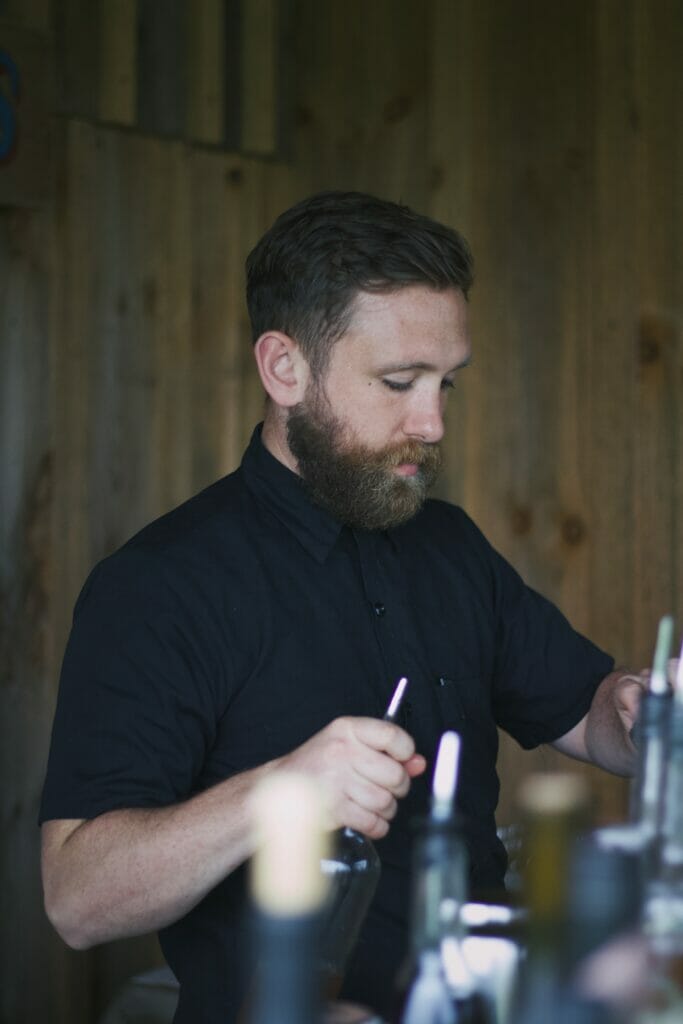Meet the Bartender-Botanist Showcasing Forgotten Ingredients
Danny Childs is untapping the beauty of terroir-driven cocktails.
Meet the Bartender-Botanist Showcasing Forgotten Ingredients
Danny Childs is untapping the beauty of terroir-driven cocktails.

courtesy of Danny Childs
In his garden, Danny Childs tends to a host of different plants that he uses to make a bevvy of drinks. There’s wormwood, rhubarb and artichoke, which he transforms into vermouth, absinthe and amaro, a bitter herbal liqueur with ancient roots. There’s also an abundance of flowers and herbs such as bee balm, shiso, mint, tarragon and basil, as well as heirloom watermelons and peppers that make their way into cocktails, too.
It might sound like any libations-loving homesteader’s dream, but this garden is not in his backyard or at a farm. These plants grow behind the farm-to-fork restaurant where he works as the bar manager, located off a well-trafficked highway in the sprawling suburban community of Cherry Hill, New Jersey.
“We’re in a strip mall with a dry cleaner on one side, a physical rehab facility on the other side [and] a kickboxing class space a couple doors down. It’s very unassuming,” he says. “But inside the restaurant and out back, we’ve really created a pretty special place.”
At the Farm and Fisherman Tavern, Childs has started his own movement centered around hyperseasonal, terroir-driven drinks—focusing mostly on cocktails. “While this conversation certainly includes beer and wine, I feel as though those two industries have done a pretty remarkable job of getting like-minded people to drink great local beers and natural, biodynamically produced wines in the last decade,” he says. “Meanwhile, the cocktail world is still stuck in the early 2000s and the conversation has hardly progressed in this direction at all.”
Childs’ botanically based methodology focuses on preservation, fermentation and reimagining how people have historically approached beverages for millennia. As a member of the Slow Food Cooks’ Alliance and the Ark of Taste committee for the northeastern United States, he’s committed to defending and rediscovering the biodiversity of his region. That means he strives to not only use local ingredients in his drinks but to also use varieties of fruits, vegetables and other plants that are native or historically important to the mid-Atlantic area.
In addition to growing specific plants in the restaurant garden and sourcing ingredients from local farms, Childs frequently goes out to forage for things such as pine, juniper, cedar, birch, wild berries and staghorn sumac. He uses what he finds as herbal or bittering agents in liqueurs and amari, adding a hyperlocal sense of place to the drinks.

Childs’ interest in plants can be traced back to his undergraduate days at the University of Delaware, where as an anthropology and pre-med student, he grew interested in ethnobotanical traditions. After graduating, he traveled to South America to study the plant-based healing practices of the Mapuche, Shipibo and Atacameño tribes in Chile and Peru. To help pay for room and board, he picked up a local bartending job.
After more than a year away, Childs returned home to New Jersey, and he and his now-wife Katie found jobs on a local farm, where they lived in a military-grade tent for nine months. Childs initially took the job at the Farm and Fisherman as a way to make some extra cash, but then something clicked. His botanical interests naturally fed into his curiosity in cocktails.
“I knew that just like when I was studying with different groups in South America, there were most certainly the same types of flavors and stories and old, ancient connections to things in this region,” he says. “It’s just that people have kind of forgotten or ignored it.”
Not long after taking the job at the restaurant, Childs launched his own cocktail project on Instagram, which he’s titled Slow Drinks. There, he’s a little more experimental, telling detailed stories about the history of fermented sassafras root beer in New Jersey, for example, or the rich tradition of making dandelion wine from the flowers that are the bane of any lawn owner.
He and his wife now own a house that sits on a half-acre of land, which of course, houses even more plants that Childs plans to experiment with further in both cocktails and non-alcoholic drinks. He hopes to inspire more people to do the same.
“It’s much more exploratory, and it forces you to go outside and maybe try your hand at fermentation,” he says. “Things are experimental and the final product is unknown. But when you taste that final product for the first time, it’s all the more special.”
Follow us
This work is licensed under a Creative Commons Attribution-NoDerivatives 4.0 International License.
Want to republish a Modern Farmer story?
We are happy for Modern Farmer stories to be shared, and encourage you to republish our articles for your audience. When doing so, we ask that you follow these guidelines:
Please credit us and our writers
For the author byline, please use “Author Name, Modern Farmer.” At the top of our stories, if on the web, please include this text and link: “This story was originally published by Modern Farmer.”
Please make sure to include a link back to either our home page or the article URL.
At the bottom of the story, please include the following text:
“Modern Farmer is a nonprofit initiative dedicated to raising awareness and catalyzing action at the intersection of food, agriculture, and society. Read more at <link>Modern Farmer</link>.”
Use our widget
We’d like to be able to track our stories, so we ask that if you republish our content, you do so using our widget (located on the left hand side of the article). The HTML code has a built-in tracker that tells us the data and domain where the story was published, as well as view counts.
Check the image requirements
It’s your responsibility to confirm you're licensed to republish images in our articles. Some images, such as those from commercial providers, don't allow their images to be republished without permission or payment. Copyright terms are generally listed in the image caption and attribution. You are welcome to omit our images or substitute with your own. Charts and interactive graphics follow the same rules.
Don’t change too much. Or, ask us first.
Articles must be republished in their entirety. It’s okay to change references to time (“today” to “yesterday”) or location (“Iowa City, IA” to “here”). But please keep everything else the same.
If you feel strongly that a more material edit needs to be made, get in touch with us at [email protected]. We’re happy to discuss it with the original author, but we must have prior approval for changes before publication.
Special cases
Extracts. You may run the first few lines or paragraphs of the article and then say: “Read the full article at Modern Farmer” with a link back to the original article.
Quotes. You may quote authors provided you include a link back to the article URL.
Translations. These require writer approval. To inquire about translation of a Modern Farmer article, contact us at [email protected]
Signed consent / copyright release forms. These are not required, provided you are following these guidelines.
Print. Articles can be republished in print under these same rules, with the exception that you do not need to include the links.
Tag us
When sharing the story on social media, please tag us using the following: - Twitter (@ModFarm) - Facebook (@ModernFarmerMedia) - Instagram (@modfarm)
Use our content respectfully
Modern Farmer is a nonprofit and as such we share our content for free and in good faith in order to reach new audiences. Respectfully,
No selling ads against our stories. It’s okay to put our stories on pages with ads.
Don’t republish our material wholesale, or automatically; you need to select stories to be republished individually.
You have no rights to sell, license, syndicate, or otherwise represent yourself as the authorized owner of our material to any third parties. This means that you cannot actively publish or submit our work for syndication to third party platforms or apps like Apple News or Google News. We understand that publishers cannot fully control when certain third parties automatically summarize or crawl content from publishers’ own sites.
Keep in touch
We want to hear from you if you love Modern Farmer content, have a collaboration idea, or anything else to share. As a nonprofit outlet, we work in service of our community and are always open to comments, feedback, and ideas. Contact us at [email protected].by Shelby Vittek, Modern Farmer
August 14, 2021
Modern Farmer Weekly
Solutions Hub
Innovations, ideas and inspiration. Actionable solutions for a resilient food system.
ExploreExplore other topics
Share With Us
We want to hear from Modern Farmer readers who have thoughtful commentary, actionable solutions, or helpful ideas to share.
SubmitNecessary cookies are absolutely essential for the website to function properly. This category only includes cookies that ensures basic functionalities and security features of the website. These cookies do not store any personal information.
Any cookies that may not be particularly necessary for the website to function and are used specifically to collect user personal data via analytics, ads, other embedded contents are termed as non-necessary cookies.
Having had many of his cocktails and pickles I can attest to his genius, creativity, and dedication.